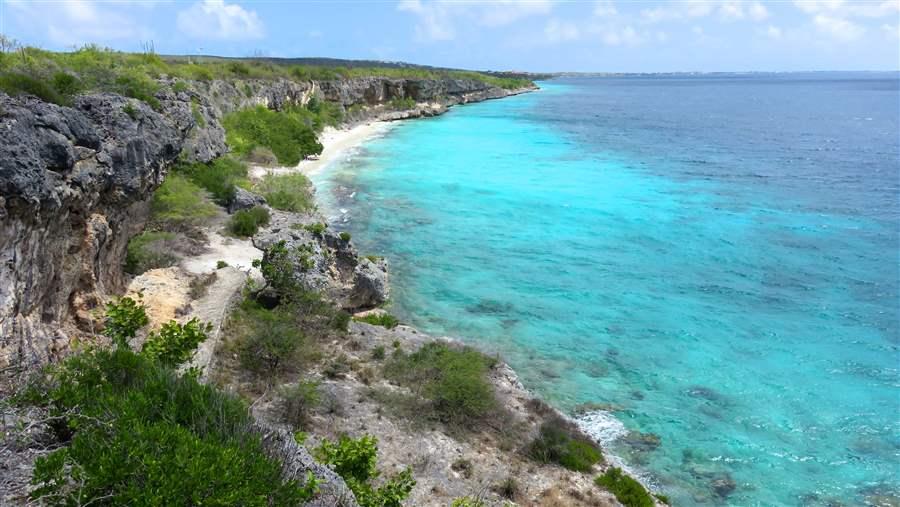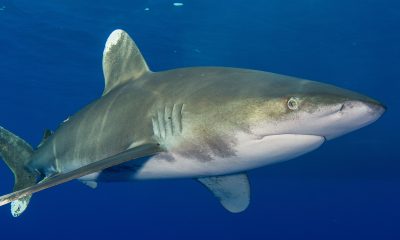News
Shark Sanctuaries Announced Around Dutch Caribbean Islands

On the 2nd September the Dutch government announced that the waters surrounding Bonaire and Saba in the Caribbean Sea will become shark sanctuaries.
Dutch State Secretary for Economic Affairs Sharon Dijksma unveiled the sanctuary plans in Kralendijk, Bonaire’s capital, and in Fort Bay on Saba. The declarations came in response to official letters written in early 2015 by the governors of the two islands in support of shark protections in their waters.
“The reserves will teach us more about the important role sharks play in the marine ecosystem,” Dijksma said. “This knowledge will contribute to the better protection of sharks.”
The sanctuaries will cover the islands’ full exclusive economic zones (EEZs). Once they are implemented, all commercial shark fishing will be prohibited up to 200 nautical miles from each island, a combined total of 22,382 square kilometers (8,816 square miles).
These actions will establish the world’s 11th and 12th shark sanctuaries. Both will also include protections for marine mammals and will be known collectively as Yarari. Regulations will be passed in the coming months to begin implementation of the two shark sanctuaries.
Worldwide, an estimated 100 million sharks are killed each year in commercial fisheries, while nearly 30 percent of all known shark species assessed by scientists are threatened with extinction. This declaration will protect some 27 species of sharks found in the waters of the Dutch Caribbean. Among those threatened and endangered are scalloped hammerhead and Caribbean reef sharks.
“Congratulations to the Dutch government and the island governments of Bonaire and Saba for raising the Caribbean’s high bar for shark protections,” said Luke Warwick, who directs Pew’s global shark conservation project. “Economic studies have demonstrated that sharks are worth far more alive than dead. Guarding sharks around these islands is beneficial, not only for the future of these ecologically important species, but also for protecting the islands’ tourism-based economies.”
The announcement follows “Dutch Shark Week,” a series of outreach and education events that started on the 24th August. Shark Week is part of a larger “Save our Sharks” project, funded by the Dutch Postcode Lottery, the largest charity lottery in the Netherlands, and managed by the Dutch Caribbean Nature Alliance (DCNA).
Nature management organizations on the Dutch Caribbean islands, including Bonaire National Parks Foundation, Saba Conservation Foundation, St. Maarten Nature Foundation, and Arikok National Park Foundation on Aruba, organized shark conservation awareness events during the week. They are working to build awareness and support for shark conservation locally, as parallel efforts organized by the Dutch Elasmobranch Society have been underway in the Netherlands.
“This is a very important step in our shark conservation efforts in the Dutch Caribbean, and we are very grateful to have State Secretary Dijksma make the announcement,” said Tadzio Bervoets, chairman of the Dutch Caribbean Nature Alliance Shark Committee. “The DCNA has launched a three-year shark conservation project to protect these crucially important, yet very misunderstood, creatures in all waters of the Dutch Caribbean. Official protection for Saba and Bonaire is a huge deal for us.”
If the Dutch Caribbean jurisdictions of St. Eustatius, Curacao, Aruba, and St. Maarten follow suit and announce permanent shark protections throughout their waters, the entire Dutch Caribbean would be recognized as a regional shark sanctuary.
Sharks play an important role in maintaining the health of the entire ocean, but they grow and reproduce slowly, which makes them particularly vulnerable to fishing pressure. Protecting all sharks by way of a sanctuary makes clear that these top predators warrant the same status as other vulnerable marine wildlife, such as turtles and whales.
Sharks are among the top species that attract scuba divers, making their presence important to the tourism industry. Safeguarding sharks strengthens the marine ecosystem, including coral reefs and commercial fish stocks. It also helps strengthen industries that depend on a healthy ocean.
Source: www.pewtrusts.org/en
Blogs
The Ocean Cleanup Breaks 10,000,000 KG Barrier

The Ocean Cleanup, the global non-profit project, has removed a verified all-time total of ten million kilograms (22 million lbs.) of trash from oceans and rivers around the world – approximately the same weight as the Eiffel Tower.
To complete its mission of ridding the oceans of plastic, The Ocean Cleanup uses a dual strategy: cleaning up the Great Pacific Garbage Patch (GPGP) to remove the plastic already afloat in the oceans, while stopping the flow of plastic from the world’s most polluting rivers.
Through cleaning operations in the GPGP and in rivers in eight countries, the cumulative total of trash removed has now surpassed ten million kilograms. This milestone demonstrates the acceleration of The Ocean Cleanup’s impact, while underlining the astonishing scale of the plastic pollution problem and the need for continued support and action.
While encouraging for the mission, this milestone is only a staging point: millions more tons of plastic still pollute our oceans and The Ocean Cleanup intends to continue learning, improving and innovating to solve this global catastrophe.
This announcement comes as governments from around the world meet to continue negotiations to develop a new legally binding instrument to end plastic pollution at INC4 in Ottawa, Canada. Representatives of The Ocean Cleanup will be in attendance and the organization will be urging decision-makers to collaborate towards a comprehensive and ambitious global treaty which addresses plastic at all stages of its life cycle and in all marine environments worldwide, including in areas beyond national jurisdiction.
It is encouraging to see that the need for remediation is reflected in the various options for potential treaty provisions. It is essential that the final treaty contains clear targets for the remediation of legacy plastic pollution, and reduction of riverine plastic emissions.
Tackling plastic pollution requires innovative and impactful solutions. The treaty should therefore incentivize the innovation ecosystem by fostering innovations that make maximal use of data, technology and scientific knowledge – such as those designed and deployed by The Ocean Cleanup.
‘After many tough years of trial and error, it’s amazing to see our work is starting to pay off – and I am proud of the team who has brought us to this point.’ said Boyan Slat, Founder and CEO of The Ocean Cleanup. ‘While we still have a long way to go, our recent successes fill us with renewed confidence that the oceans can be cleaned.’
The Ocean Cleanup was founded in 2013 and captured its first plastic in 2019, with the first confirmed catch in the GPGP coming soon after the deployment of Interceptor 001 in Jakarta, Indonesia. After surpassing one million kilograms of trash removed in early 2022, the non-profit project has since progressed to the third iteration of its GPGP cleaning solution, known as System 03, and a network of Interceptors currently covering rivers in eight countries, with more deployments set for 2024.
About The Ocean Cleanup
The Ocean Cleanup is an international non-profit organization that develops and scales technologies to rid the world’s oceans of plastic. They aim to achieve this goal through a dual strategy: stemming the inflow via rivers and cleaning up the legacy plastic that has already accumulated in the ocean. For the latter, The Ocean Cleanup develops large-scale systems to efficiently concentrate the plastic for periodic removal. This plastic is tracked and traced through DNV’s chain of custody model to certify claims of origin when recycling it into new products. To curb the tide via rivers, The Ocean Cleanup has developed Interceptor™ solutions to halt and extract riverine plastic before it reaches the ocean. Founded in 2013 by Boyan Slat, The Ocean Cleanup now employs a broadly multi-disciplined team of approximately 140. The foundation is headquartered in Rotterdam, the Netherlands.
For more information, visit: theoceancleanup.com and follow @theoceancleanup on social media.
Marine Life & Conservation
Steve Backshall to headline Shark Trust’s flagship event: For the Love of Sharks

Join a host of amazing, shark loving, speakers including Steve Backshall and the Shark Trust team for an evening celebrating shark conservation at the Royal Geographical Society in London this November.
Date: 29th November 2024
Time: 6-10pm
Location: Royal Geographical Society, London
Tickets: https://www.sharktrust.org/Event/flos24
The event will be a celebration of all things shark. Those lucky enough to get hold of tickets will hear from engaging guest speakers with a passion for sharks.
The line-up includes (*subject to change if unforeseen circumstances arise)
Steve Backshall: One of television’s busiest presenters, BAFTA award-winning wildlife expert Steve has been passionate about the wild world ever since he was young.
Steve’s impressive TV career has taken him all around the world, investigating a wide array of species and environments. Steve has filmed over 100 hours of children’s wildlife programmes with the BAFTA award winning Deadly 60 franchise and recently, with Sky Nature, for his new series ‘Whale with Steve Backshall’. He has been a patron for the Shark Trust for 10 years.
Simon Rogerson: is a photojournalist specialising in natural history, diving and the sea.
He is editor of SCUBA magazine, the official journal of the British Sub-Aqua Club. Simon started his career as a crime reporter but gravitated towards his ‘less depressing’ interest in underwater exploration, joining the staff of DIVE magazine in 1999. In 2005 he was named ‘Editor of the Year’ in the PPA’s Independent Publishing Awards. Simon also works as a freelance writer, contributing frequently to the Sunday Times and Telegraph, in addition to BBC Wildlife, Esquire, and a host of international diving magazines. He is the author of a book, Dive Red Sea, published by Ultimate Sports. Now based in Berkshire, Simon has been a Patron of the Shark Trust for 20 years.
More speakers to be announced soon. Head to the Shark Trust website to learn more.
The evening will also allow guests the final chance to see the Oceanic 31, shark art exhibition. Some of the artwork will be auctioned/raffled at the event, while the rest will be auctioned online to raise money for the Shark Trust Oceanic Programme.
For the Love of Sharks is an evening with something for everyone who is interested and fascinated by sharks. Join the Shark Trust, their Patrons, Trustees and Staff, along with a host of supporters for this celebration of shark conservation.
For more information or to buy a ticket: https://www.sharktrust.org/Event/flos24
-

 News3 months ago
News3 months agoHone your underwater photography skills with Alphamarine Photography at Red Sea Diving Safari in March
-

 News3 months ago
News3 months agoCapturing Critters in Lembeh Underwater Photography Workshop 2024: Event Roundup
-

 Marine Life & Conservation Blogs3 months ago
Marine Life & Conservation Blogs3 months agoCreature Feature: Swell Sharks
-

 Blogs2 months ago
Blogs2 months agoMurex Resorts: Passport to Paradise!
-

 Blogs2 months ago
Blogs2 months agoDiver Discovering Whale Skeletons Beneath Ice Judged World’s Best Underwater Photograph
-

 Gear Reviews3 weeks ago
Gear Reviews3 weeks agoGEAR REVIEW – Revolutionising Diving Comfort: The Sharkskin T2 Chillproof Suit
-

 Gear Reviews3 months ago
Gear Reviews3 months agoGear Review: Oceanic+ Dive Housing for iPhone
-

 Marine Life & Conservation2 months ago
Marine Life & Conservation2 months agoSave the Manatee Club launches brand new webcams at Silver Springs State Park, Florida

















